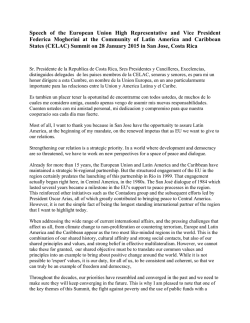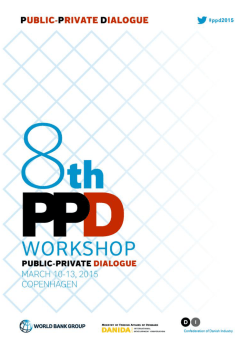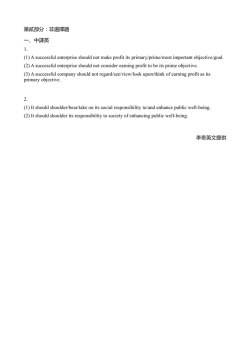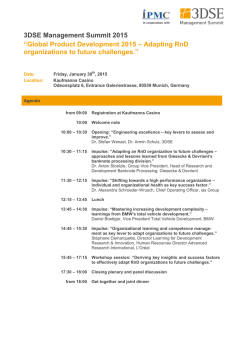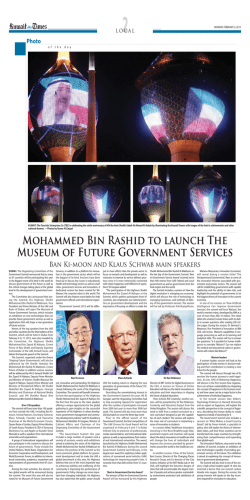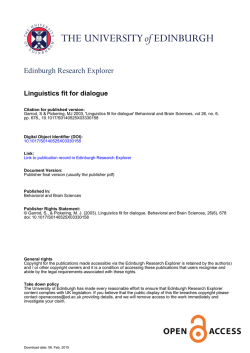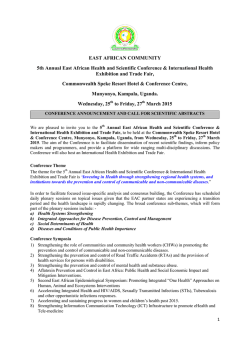
Latin America and the Caribbean - European External Action Service
EN COUCIL OF THE EUROPEA UIO Santiago de Chile, 27 January 2013 5747/13 PRESSE 31 SATIAGO DECLARATIO I. ew CELAC-EU Dialogue 1. We, the Heads of State and Government of the Community of Latin American and Caribbean States (CELAC) and the European Union (EU), and the Presidents of the European Council and the European Commission, have convened in Santiago, Chile, on 26 and 27 January 2013, to renew and deepen our Strategic Partnership, under the theme: “Alliance for Sustainable Development: Promoting Investments of Social and Environmental Quality”. 2. For the first time, Latin America and the Caribbean gather today for the biregional dialogue at the highest level within the framework of CELAC, the representative mechanism of this region that shall promote its interests and objectives on integration and development. We welcome this regional development, which demonstrates the political will of CELAC Member States to move forward together through the work carried out by the CELAC troika. 3. We recall previous EU-LAC Summits that have served to strengthen the biregional dialogue on issues of common interest and we note CELAC’s will to uphold dialogue with the EU, expressed in its decisions at its highest levels. We are confident that this new approach will result in an even more balanced, efficient, constructive and symmetrical relation with complementarity and solidarity between the two regions. We reaffirm the importance of relying on a socially constructive, inclusive and diverse dialogue to achieve the commitments outlined in this Declaration. II. Shared values and positions in the international and multilateral arena 4. We ratify the consensus reached in our previous Summits which have reinforced our positions in the international and multilateral arena, and in this regard, we reaffirm our commitment to multilateralism. PRESS Rue de la Loi 175 B – 1048 BRUSSELS Tel.: +32 (0)2 281 6319 Fax: +32 (0)2 281 8026 [email protected] http://www.consilium.europa.eu/Newsroom 5747/13 1 E 5. We reaffirm our commitment to all the purposes and principles enshrined in the Charter of the United Nations. We reaffirm our decision to support all efforts to uphold sovereign equality of all States, to respect their territorial integrity and political independence, to refrain in our international relations from the threat or use of force in any manner inconsistent with the purposes and principles of the United Nations, to uphold the resolution of disputes by peaceful means and in conformity with the principles of justice and international law. 6. We firmly reject all coercive measures of unilateral character with extraterritorial effect that are contrary to international law and the commonly accepted rules of free trade. We agree that this type of practice poses a serious threat to multilateralism. In this context, and with reference to UNGA resolution A/RES/67/4, we reaffirm our well-known positions on the application of the extra-territorial provisions of the Helms-Burton Act. 7. We reaffirm our commitment to the universality and indivisibility of human rights as laid down in the Universal Declaration of Human Rights. We reaffirm our resolve to fulfil our obligations stemming from international human rights covenants and conventions which we have ratified, and our commitment from declarations to which we have subscribed, to continue improving international cooperation as well as the promotion and protection of human rights in our countries. We underline the central role of the United Nations and the contribution of human rights bodies and organizations such as the Human Rights Council and we commit ourselves to continue collaborating in order to strengthen them. 8. We reiterate our strong condemnation of terrorism in all its forms and manifestations, committed by whomever, wherever and for whatever purposes, and express our determination to combat effectively terrorism in all its forms and manifestations in accordance with the Charter of the United Nations and international law, including international human rights, refugee and humanitarian law. 9. We reaffirm our commitment to fight impunity, in particular for the most serious crimes under international law, notably those referred to in the Rome Statute of the International Criminal Court (ICC). Their prosecution should be ensured by taking measures at the national or appropriate level and by enhancing international cooperation. We invite those countries which are not parties to consider the possibility to ratify or accede, as applicable, to the Rome Statute. 10. We reaffirm our commitment to adopt policies that promote trade and investment between CELAC and EU countries, convinced that this will contribute to ensuring sustainable development and can foster economic growth and the generation of employment, especially youth employment, in both regions. These policies should be based on cooperation and complementarity, on solidarity and social inclusion, on environmental responsibility - taking into account the principle of common but differentiated responsibilities and respective capabilities -, on equity and equal opportunities, on mutual benefits, and considering, as appropriate, the different levels of development and respective priorities of CELAC and EU countries. In this regard, they should aim at facilitating and deepening, as appropriate, trade agreements, the integration of productive chains, technology transfer, and at promoting the participation of micro, small and medium-sized enterprises as well 5747/13 2 E as local and indigenous actors in accordance with national circumstances in biregional trade. Reaffirming that trade and investment promote economic growth, we recognise the importance of stable and transparent regulatory frameworks in both regions and of providing legal certainty for economic operators. We commit to maintain a supportive business environment for investors, recognising nonetheless the right of countries to regulate in order to meet their national policy objectives in accordance with their international commitments and obligations. Likewise, it is also vital that investors comply with national and international law, in particular, inter alia, on taxes, transparency, protection of the environment, social security and labour. 11. We reiterate our commitment to avoid protectionism in all its forms. We remain determined to favour an open and non-discriminatory, rules-based multilateral trade system and fully respect its disciplines, and we recognise its contribution in promoting the recovery from the economic crisis, and in promoting growth and development in line with the principle of special and differential treatment for developing countries where appropriate, as expressed in the 2010 Madrid Summit. In this context, we agreed on the importance of strengthening the multilateral trading system by achieving an ambitious, comprehensive and balanced conclusion of the Doha Development Round. 12. We also express our concern about the present economic crisis and that recovery remains very slow. In this regard, we reiterate our commitment to continue working together towards a new international financial architecture, as agreed in the 2010 Madrid Summit. This includes the reforms already agreed. We also remain committed to the full, timely and consistent implementation of the international financial regulation agenda so as to strengthen the resilience of the financial system and reduce systemic risks which is key for a comprehensive reform of the global financial system. 13. We express our commitment to achieve sustainable development in its three dimensions: economic, social and environmental, in an integrated and balanced way. In this regard, we support all initiatives which imply the strengthening of cooperation, the transfer of knowledge and the preservation and conservation of natural and cultural heritage as well as the protection of biodiversity. We also reaffirm the sovereign right of States over their own natural resources and their responsibility to preserve the environment, in accordance with national and international law and principles and in line with the Declaration of the United Nations Conference on Sustainable Development (Rio+20), held in Rio de Janeiro, 20-22 June 2012. 14. We welcome the outcome of Rio+20, and the adoption of the document ‘The Future We Want’ as a further step towards the achievement of sustainable development in all its dimensions by all countries, while underscoring that the eradication of poverty is the greatest global challenge facing the world today and an indispensable requirement to achieve such development. Reaffirming the role of the UN General Assembly, we underscore the importance of a strengthened institutional framework for sustainable development, including by strengthening the ECOSOC and the UN Environment Programme, and the prompt establishment of the High Level Political Forum on Sustainable Development. We agree to work together in the achievement of the UN Development Agenda beyond 2015 and to 5747/13 3 E make efforts toward the integration of the three dimensions of sustainable development. In coherence with and integrated in this Agenda, we look forward to the implementation of the Rio+20 mandate for the elaboration of a set of Sustainable Development Goals (SDGs) in the appropriate fora, the work coming out of the Open Working Group on SDGs, and the Intergovernmental Committee on a Sustainable Development Financing Strategy. We agree that the development of these goals should not divert focus or effort from the achievement of the Millennium Development Goals. 15. We reiterate our adherence to the United Nations Framework Convention on Climate Change (UNFCCC) and all its principles, including CBDR-RC. We express our will to adopt a protocol, another legal instrument or an agreed outcome with legal force under the UNFCCC by 2015 and for it to come into effect and be implemented from 2020, applicable to all parties and guided by the principles of the UNFCCC, in line with the outcomes of Cancun (2010), Durban (2011) and Doha (2012), with a view to reducing greenhouse gas emissions. In this regard, we welcome the adoption and recognise the importance of the implementation of the second commitment period of the Kyoto Protocol and we encourage increasing its level of ambition of reductions of Green House Gas (GHG) emissions, in accordance with the principles and provisions of the UNFCCC and encourage Annex I countries to the Convention that have not done so to join the second commitment period under the Kyoto Protocol. We welcome the Doha decision on a concrete work plan of the Durban platform and take note of the announcement of a high level meeting on Climate Change in 2014. We also stress the importance of addressing the adaptation and mitigation needs of particularly vulnerable developing countries, including the small island developing states, as well as other developing countries, through the provision of more adequate and predictable financing, as well as technology and capacitybuilding support, in accordance with the UNFCCC. 16. We take note of the contributions of the EUrocLIMA programme. The participants in this programme welcome the extension into a second phase, to which the Caribbean region could be associated, in line with the recently adopted EU-Caribbean Strategy. 17. We agree that prioritising social development, health, education, and promoting sustained and inclusive economic growth, while ensuring an inclusive, fair and equitable society and healthy conditions is essential to achieve sustainable development. In order to ensure peoples’ quality of life and the environment in which they live, we reiterate our commitment to work steadily towards eradicating poverty, fostering equality, including gender equality, and social inclusion, and to protect the most vulnerable groups – including indigenous peoples and their communities - by improving policies and providing, among others, adequately resourced basic health services, water and sanitation, housing, education, public transport and energy. We reiterate the right of citizens to participate in the formulation, implementation and monitoring of public policies. We especially pledge to promote social programmes for the protection of the family, recognising its important role in safeguarding cultural traditions and values. 5747/13 4 E We also reiterate our commitment to the current initiatives for the eradication of hunger and poverty in line with the Millennium Development Goals and to enhancing food security and access to adequate, safe and nutritious food for present and future generations, in line with the Rio+20 declaration “The Future We Want” regarding food security and nutrition and sustainable agriculture. 18. The universal access and use of Information and Communication Technologies (ICTs) play an essential role regarding the importance of the participation of citizens in the formulation, implementation and monitoring of public policies. In this regard, we call upon all States to remove barriers and to bridge the digital divide, and to promote and facilitate universal access to ICTs. Furthermore, we recall resolution 20/8 “The promotion, protection and enjoyment of human rights on the Internet” adopted by consensus by the UN Human Rights Council. III. Progress in the bi-regional Strategic Partnership process 19. We recognise the progress achieved in the implementation of our bi-regional Action Plan and welcome its deepening through the incorporation of new chapters on gender and investment in the EU-CELAC Action Plan 2013 – 2015 adopted today here in Santiago. We hereby agree to task our Senior Officials when carrying out its review, to study possible incorporation of additional chapters covering areas of bi-regional interest, such as Higher Education, Public Security, and Food Security and Nutrition. 20. In view of the contribution that CELAC and the EU can make for peace in the international arena, we agree to explore together ways to foster cooperation for peace and the peaceful settlement of disputes, as well as the promotion of disarmament and non-proliferation at the international level. In this regard, we will cooperate for the success of the 2015 NPT Review Conference. 21. We express our support for the conclusion of negotiations of a legally binding Arms Trade Treaty, to be adopted on the basis of resolution 67/234 of the UNGA and fully consistent with the UN Charter, while taking into account the inherent right of all States to individual or collective self-defence. Those negotiations will be concluded through the convening of a final United Nations Conference on the Arms Trade Treaty from 18-28 March 2013. The Arms Trade Treaty would contribute to preventing and combating the illicit arms trade, and shall help to reduce the human cost of a poorly regulated international arms trade in conventional weapons, including small arms, light weapons and ammunition. 22. We, CELAC and the EU, welcome the progress achieved since the Madrid Summit in the relations between individual CELAC countries and sub-regions and the EU, in particular as regards: • The signature and the respective ratification processes that will lead to the imminent provisional application of the far-reaching Free Trade Agreement between the EU and Colombia and Peru; • The signature and respective ratification processes that will lead to a provisional application of the comprehensive EU-Central America Association Agreement; 5747/13 5 E • The support to the Central American Regional Security Strategy and its implementation; • The negotiation of the EU-Colombia and Peru Cultural Cooperation Agreement; • Continued negotiations for the establishment of an Association Agreement between the EU and Mercosur; • The holding in November 2012 of a meeting at the highest level between the EU and Chile and the agreement in that meeting to explore the options to modernise the Association Agreement after 10 years of Association; • The extension of the Strategic Partnership Joint Executive Plan and the agreement to explore the options for a comprehensive update of the Economic Partnership, Political Coordination and Cooperation Agreement between the EU and Mexico. • The VI EU-Brazil Summit, held in Brasilia on 24 January 2013, reflected the maturity of the bilateral dialogue and the deepening of the strategic partnership established in 2007. • The conclusion of negotiations on, and adoption of, the Joint Caribbean-EU Partnership Strategy and the establishment of the Caribbean Investment Facility to support investments in the Caribbean; • The conclusion of the national ratification process of the Political Dialogue and Cooperation CAN-EU Agreement and the Joint Declaration approved in the XI meeting of the High Level Specialized Dialogue on Drugs CAN-EU, held in Quito on 30-31 October 2012. 23. We take note of the pioneering role played by the European and Latin American Parliaments to support the bi-regional Strategic Partnership, and also of the proposals of the latest Euro-Latin American Parliamentary Assembly (EuroLat). 24. We also take note of the I CELAC-EU Judicial Summit held in Santiago on 10 and 11 January 2013 with the aim of establishing a bi-regional forum to discuss “Shared Principles in International Judicial Cooperation Matters”, enhancing dialogue and cooperation between our countries' judicial institutions. 25. We recognise that our Strategic Partnership is even more relevant in times of financial and economic crisis and social complexities when our peoples demand more inclusive forms of participation to meet their basic development needs and to achieve sustainable development. We take note of the conclusions of the preparatory CELAC-EU fora, which provide valuable inputs to enhance our Strategic Partnership, and we welcome the Santiago Summit efforts to further facilitate channels between governments and their respective civil societies. We acknowledge the importance of implementing Principle 10 of the 1992 Rio Declaration at the Earth Summit, and reiterate the importance of advancing initiatives in this matter. We acknowledge the meetings of the EU-CELAC Organised Civil Society, Trade Unions and Civil Society that took place in Santiago in 2012 for the preparation of this Summit. 5747/13 6 E 26. We salute the establishment in Hamburg of the EU-LAC Foundation, which in its transitional form as a foundation under German law has started to serve as a useful tool for strengthening our bi-regional partnership and a means of triggering debate on common strategies and actions as well as enhancing its visibility. We also welcome the participation of ECLAC, FUNGLODE, Institut des Amériques and the Lombardy region as strategic partners of the Foundation. We call for the early conclusion of the negotiations for an international constituent agreement to upgrade the Foundation to an international organisation of intergovernmental nature subject to international public law. 27. We recognise the need to strengthen bi-regional cooperation and to improve the coherence and effectiveness of our development cooperation policies, including the achievement of the Millennium Development Goals. We reiterate our commitment to pay special attention to the vulnerabilities of least developed countries, land-locked developing countries and small island developing states. In this regard, we recall the EU’s commitment to achieve its collective target of ODA/GNI ratio of 0.7% by 2015, as stated in the Monterrey Consensus and the Vienna and Madrid Summit Declarations. We reaffirm our commitment to continue cooperating with middle income CELAC countries, taking into account their different levels of development, and to the dialogue to define and agree the most appropriate form of cooperation for the future. 28. We stress the importance of triangular, south-south and other modalities and mechanisms of cooperation. We also stress the importance of cooperation for capacity-building and greater involvement of local and indigenous communities as well as corporations, higher education institutions and research institutes for development initiatives that support, among others, high quality knowledge, entrepreneurship and innovation in the pursuit of sustainable development. Consistent with the agreements reached at this Summit, we expect that the next cooperation programming cycle (2014-2020) will take into account the priorities of CELAC States and give preference to projects that address the three dimensions of sustainable development. We reaffirm the importance of regional cooperation programs that support sustainable development. 29. We commend the advances in adopting a Road Map for the implementation of the Joint Initiative for Research and Innovation to contribute to a new dynamism in building the EU-CELAC Knowledge Area. We welcome the common objectives and joint activities identified by the relevant working groups and encourage efforts for their prompt implementation. In this context, we endorse the commitment expressed by the November 2012 meeting of research and innovation funding agencies of both regions to foster joint mobilisation of different cooperation instruments in flexible ways. We also recognise the important contribution of higher education programmes for academic cooperation and international student, research and academic staff mobility between our regions. We firmly believe in the importance of investments in the field of higher education, research and innovation for promoting growth, employment and sustainable development. In this context, we take note of the I Academic Summit held in Santiago on 22 and 23 January 2013. Furthermore, we reiterate the importance of improving direct regional broadband interconnectivity, especially 5747/13 7 E with a view to facilitating academic and knowledge exchange among research groups and institutions from both regions. 30. Recalling the commitments undertaken by us at the Lima and Madrid Summits, we support the continued strengthening of the CELAC-EU Structured Dialogue on Migration, including the identification of joint actions on specific issues that aim to improve bi-regional human mobility while ensuring full respect and protection of the human rights of migrant persons. Acknowledging the changes in the migration flows between our regions, we decide to study the migratory routes between Latin America and the Caribbean and the European Union and we take note of the first Statistical Compendium on CELAC-EU Migration as a valuable source of information to formulate public policies based on qualitative and quantitative knowledge of bi-regional migration trends. In this regard, we also take note of the recent EU study on this matter. Furthermore, it is urgent to address the growing population displacements due to climate change and/or natural disasters in developing countries, particularly in Small Island Developing States and in States with high mountain ecosystems as well as other highly vulnerable States. We stress the importance of integration and the fight against racism, discrimination and xenophobia and other related forms of intolerance. 31. We are committed to work together to better organise regular migration and to address irregular migration. We are also committed to prevent and fight the smuggling of migrants and trafficking in human beings, as well as to provide assistance to the victims. 32. As regards social security systems in the EU and CELAC, we express our willingness to exchange experiences and best practices and to explore possibilities for bi-regional cooperation, including the establishment of bilateral social security agreements between individual CELAC countries and EU Member States wishing to do so, respecting domestic legislations and existing bilateral and/or multilateral social security agreements between CELAC-EU states, such as the IberoAmerican Social Security Convention. 33. We ratify our unwavering resolve to protect and foster the safety and health of workers in both regions and commit to develop a "CELAC-EU Roadmap on Safety and Health at Work", in line with the corresponding principles embodied in the Conventions of the International Labour Organization. 34. We recognise that transnational organised criminal activities may undermine the legitimate economies and, in some cases, threaten the stability and security of States, weaken the rule of law, governance systems, national economies and their development, and human rights. In this regard, we vow to continue implementing, as appropriate, concrete actions, aimed at strengthening, inter alia, law enforcement cooperation, mutual legal assistance, trans-border intelligence sharing, in order to dismantle criminal organizations, all within the full respect of human rights and international law. 5747/13 8 E 35. We agree to strengthen the CELAC-EU Coordination and Cooperation Mechanism on Drugs, and encourage the full implementation of the Declaration issued at the XIV High Level bi-regional Meeting. We are committed to a continued dialogue and cooperation towards establishing measurable goals to reduce the impact of the world drug problem, including, among others, strengthening of information exchange mechanisms regarding supply and demand reduction; continued dialogue and measures related to alternative development, including preventive alternative development such as a global stamp for products stemming from alternative development programs in accordance with WTO rules; strategies to address prevention, early intervention, treatment, rehabilitation, social reintegration and the reduction of the negative health and social consequences of drug abuse; capacity building and other relevant cooperation in the fields of law enforcement; and, as appropriate, triangular and south-south cooperation. These efforts must be based on a comprehensive and balanced approach, to address both drug demand and drug supply reduction, under the principle of common and shared responsibility, and respect for human rights and international law. 36. We welcome the convening, in early 2016, of a special session of the General Assembly of the United Nations on the world drug problem, as agreed in UNGA resolution A/RES/67/193 to review the progress in the implementation of the Political Declaration and Plan of Action on International Cooperation towards an Integrated and Balanced Strategy to Counter the World Drug Problem, including an assessment of the achievements and challenges in countering the drug problem, within the framework of the three international drug control conventions and other relevant United Nations instruments. In this regard, we support possible responses for enhancing the effectiveness of strategies and instruments available for the international community to face in an integral and balanced manner the challenges and consequences posed by the World Drug Problem under the principle of common and shared responsibility. We also commit to identify the most effective strategies to combat the world drug problem in all its dimensions. With this in mind, initiatives and studies being developed in the Latin American and the Caribbean region and in the European Union, and the participation of both regions in this process, may provide a very valuable contribution to the regional and global discussion on the World Drug Problem. 37. We recognise that corruption may undermine democratic institutions, affect economic development and contribute to governmental instability. We commit to promote the fight against corruption, fraud and non-ethical conducts, in particular bribery of public officials in international business transactions in our countries. At the same time, we also recognise that the strengthening of institutions contributes to the fight against corruption. We also reaffirm our commitment to the implementation of the United Nations Convention against Corruption, to improve cooperation mechanisms for asset recovery and to promote adherence to corporate social responsibility principles. 5747/13 9 E 38. We welcome the creation of a bi-regional dialogue on gender issues to be launched by a dedicated high level meeting and agree that the inclusion of this perspective in the CELAC-EU partnership will strengthen gender equality, democracy and foster fair and egalitarian societies. We reaffirm the need to increase women’s empowerment by strengthening their political participation and leadership, economic autonomy and equal and balanced participation in the labour force, and we restate our strong commitment to eradicate all forms of violence and discrimination against women and gender-based killings which are their most serious manifestation. We support actions taken by states, international organizations, and civil society to fight this horrendous crime. We also express our commitment to promote the recognition of rural women’s work and its important contribution to sustainable development. IV. Alliance for Sustainable Development: Promoting Investments of Social and Environmental Quality 39. We believe that the theme of this Summit is a guide to achieving sustained economic growth while protecting the environment and promoting social equity and inclusion. Investments, when they are aligned with the law and take into account national development strategies and policies, may play a key role in nurturing development and in creating decent and dignified work with social inclusion. Investments should aim at providing positive spill-over effects on other sectors, social and environmental responsibility, and contribute to the development of local communities and indigenous peoples. Sustainable development embodies the needs and complementarities of both regions, and is a hallmark of our bi-regional Strategic Partnership. Therefore, we support productive investments that comply fully with and integrate economic, social and environmental dimensions of sustainable development. 40. We affirm that there are different approaches, visions, models and tools available to each country, in accordance with its national circumstances and priorities, to achieve sustainable development in its three dimensions which is our overarching goal. In this regard, we consider the green economy in the context of sustainable development and poverty eradication as one of the important tools available for achieving sustainable development, and that it could provide options for policymaking but should not be a rigid set of rules. We emphasize that it should contribute to eradicating poverty, as well as sustained economic growth, enhancing social inclusion, improving human welfare and creating opportunities for employment and decent work for all, while maintaining the healthy functioning of the Earth`s ecosystems. 1 41. We acknowledge that achieving sustainable development requires cooperation to take advantage of the complementarities of both regions. Hence, we endeavour to promote increased and diversified bi-regional investments of Social and Environmental Quality in line with sustainable development and with corporate social responsibility, providing stable conditions for the creation of new enterprises. We support investments that respect national and international law, are productive, generate added value, promote social inclusion, are 1 The Plurinational State of Bolivia formulates a reserve with respect to this paragraph 5747/13 10 E environmentally sound and in harmony with nature, stimulate innovation, entrepreneurship, a greater articulation with SMEs, technology transfer, creation of better quality employment, human capital formation and on-going training to facilitate the transition to the labour market, with particular attention to women, young people, people with disabilities and other vulnerable groups. Socially responsible business practices –including environmental care– create positive relations between producers, workers and consumers, and for the welfare of present and future generations, as stated in the Rio + 20 Declaration “The future we want”. We acknowledge and encourage the active participation of the private sector in corporate social responsibility programmes. Furthermore, we promote respect for recognised international principles, good practices and guidelines on corporate social responsibility, taking into account the special needs of small- and medium enterprises and of developing countries, in particular for capacitybuilding. To this end, we invite Senior Officials to organize an EU-CELAC Seminar. 42. We recognise that planet Earth and its ecosystems are our home and that “Mother Earth” is a common expression in a number of countries and regions and we note that some countries recognise the rights of nature in the context of the promotion of sustainable development. We are convinced that in order to achieve a just balance among the economic, social and environmental needs of present and future generations, it is necessary to promote harmony with nature. 43. We recognise that fundamental changes in the way societies consume and produce are indispensable for achieving global sustainable development and underscore the importance of strengthening scientific and technological capacities to move towards more sustainable patterns of consumption and production. In this regard, we recall the adoption in Rio+20 of the 10-year Framework of Programmes on Sustainable Consumption and Production Patterns. Both regions will work together to find common grounds for sustainable development in areas such as national capacity building, innovative solutions, transfer and adaptation of “state of the art” environmentally sound technologies in harmony with nature, within the context of each country’s needs and capabilities. 44. We acknowledge the strategic role of energy for sustainable development, with an emphasis on energy exchanges, increasing levels of energy supply, access, with special regard to most vulnerable groups, reliability, and quality. We support productive investments that increase participation and sustained growth of renewable energy sources in national and regional energy grids, in accordance with each country’s development views and policies, needs, conditions and resources, as well as investments that provide technology transfer and improve energy efficiency and energy savings. 45. With the purpose of strengthening the bi-regional Strategic Partnership and recognising the duty of States to take all appropriate measures to ensure the common good of their societies, prioritising the most vulnerable groups, we emphasise the importance of working together to promote investments that support sustainable and sound use of natural resources, environmental care, and economic and social development, and to maintain a favourable investment climate, with legal certainty and respect of national and international law, taking into account the principle of complementarity based on common interests and 5747/13 11 E similar efforts developed at the multilateral level. In this regard, we stress the importance of a stable and transparent regulatory framework that provides certainty to investors, while recognising the sovereign right of States to regulate. We encourage initiatives to outline national, sub-regional or regional Action Plans that favour micro, small and medium-sized enterprises, taking into account their central role in the economy and as a source of innovation and jobs, Corporate Social Responsibility and good practices in terms of innovation and entrepreneurship, in line with national law, policies and development strategies. We welcome the CELAC-EU Ministers of Economy Meeting of Puerto Varas, Chile, and the Presidency’s conclusions. 46. We encourage strengthening the Latin America Investment Facility, to improve integration, energy and transport infrastructures, energy efficiency, renewable energy, sustainable communications networks, and to promote sustainable development through stronger social services and increased support to SMEs. We support that the Facility takes due account of the three dimensions of sustainable development in its projects, and we acknowledge its role as regards technology and knowledge transfer. We also commend the creation of the Caribbean Investment Facility and encourage its speedy implementation. 47. We agree to hold the next CELAC-EU Summit in Brussels in 2015. 48. We commend Chile for the organization of this Summit, which enriched the biregional agenda and was instrumental to achieve substantial progress. 5747/13 12 E
© Copyright 2026
